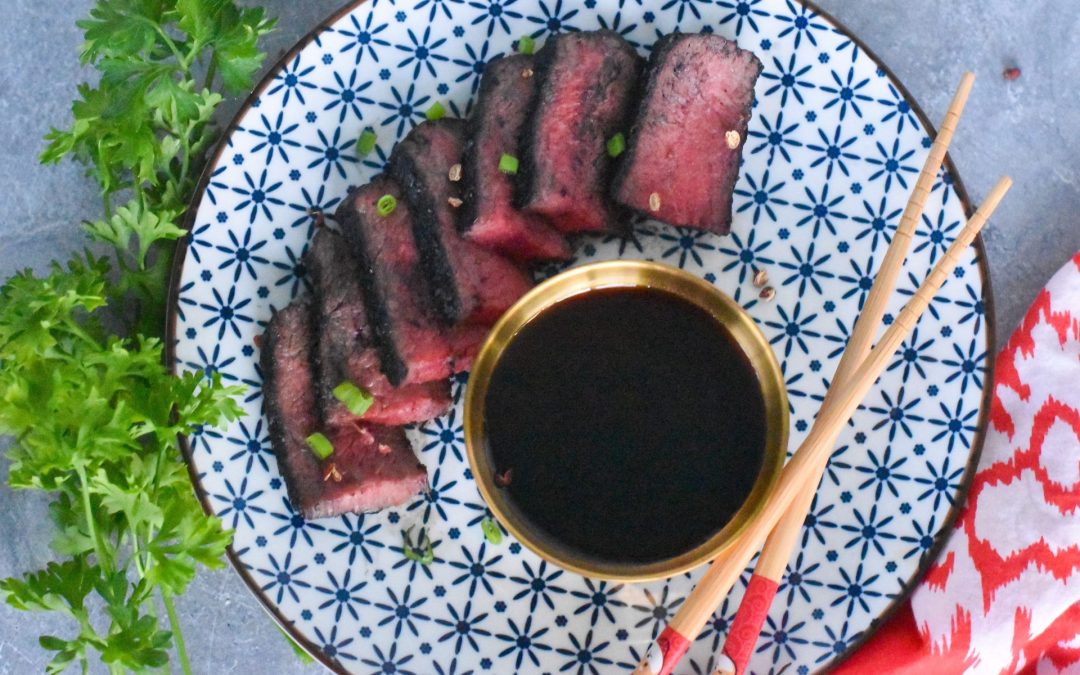Just when you think you’ve tried all the best cuts on the cow, you then try the “Denver Steak” and your mind is blown. Where has Denver Steak been hiding all my life? Denver steak is also known as Zabuton, which is the Japanese word for pillow and the cushion shape it is often cut into, so you know this is going to be good!
Move over filet, a new cut that is tender, rich and beefy is in town! And with a smaller price tag than a filet- this is news to my ears! In this recipe, I show you how to cook Denver steak with a Japanese style dipping sauce that pays homage to Zabuton's Japanese heritage and the American Wagyu cut I used in this recipe.
What Cut of the Cow Does Denver Steak Come From?
The Denver Steak comes from the chuck primal section of the cow, which is the shoulder area that is heavily worked. This is why beef chuck cuts are usually less desirable and more affordable.
The beauty of the Denver steak is that while it is from the chuck primal area, it comes from the Serratus Ventralis muscle which is buried deep in the shoulder blade area and barely used, making it a tender (and more affordable) cut.
Why You’ll Love This Denver Steak Recipe
In honor of the Japanese word for “pillow/cushion”, which refers to the shape this cut is often presented in, I used a Japanese dipping sauce to pair with this American Wagyu Denver Steak I got from Snake River Farms. This Ume Gyu Dare dipping sauce recipe from “The Japanese Grill” cookbook by Tadashi Ono, is normally used for Filet Mignon/Beef Tenderloin but I used it with this Denver Steak / Zabuton instead. In Japanese tradition, the steak is thinly sliced and served with this Ume Gyu Dare Japanese dipping sauce that can be used as both a marinade and dipping sauce.
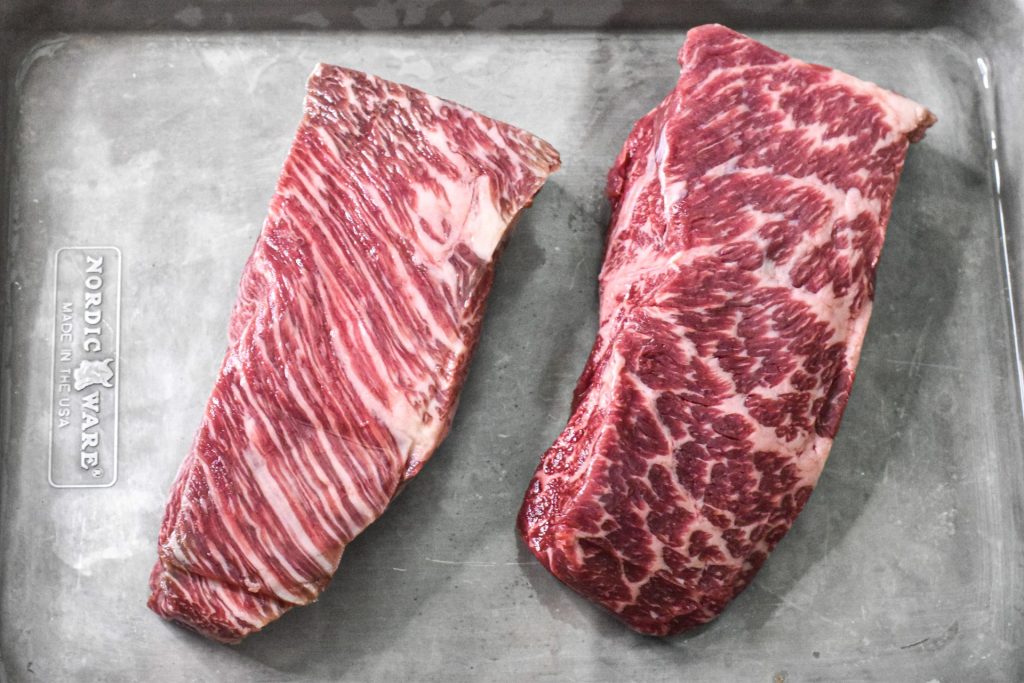
These Snake River Farm American Wagyu Steaks have amazing marbling!! They tasted like buttah!
Ingredients for this Japanese-Inspired Denver Steak Recipe
- 2 Snake River Farms American Wagyu Denver Steaks (Snake River Farms labels this as Zabuton)
- 1- 2 tbsp kosher sea salt
- 1 tbsp fresh ground black pepper
- 1 cup Gyu Dare Dipping Sauce and Marinade (ingredients below)
- 1 tbsp Ume Paste – aka “Umeboshi Paste”, “Pickled Ume Plum Puree” – this is the one I use that I use found on Amazon
Ume Gyu Dare Dipping Sauce Ingredients
Recipe from Japanese Grill Cookbook
- ¾ cup soy sauce (you can swap with Coconut Aminos if you are soy and or gluten free)
- ½ cup sake
- ½ cup mirin
- ¼ cup rice vinegar
*Note, all marinade ingredients can be found at most grocery stores except the Ume Paste- this will need to be ordered online, as will the Denver steaks which are not common to find in most grocery stores).
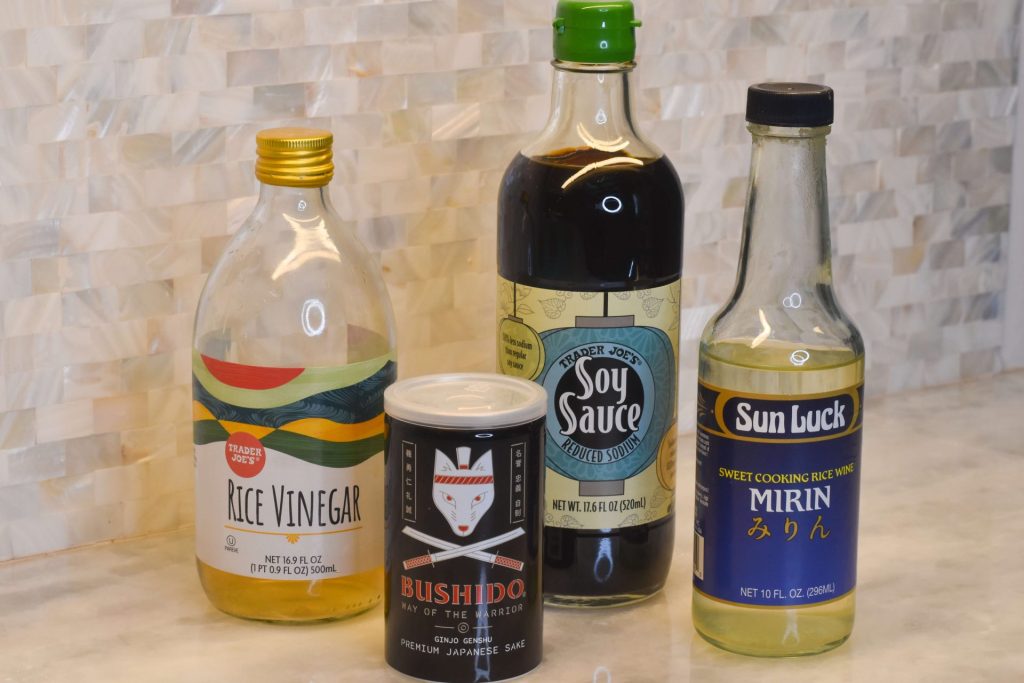
The ingredients that make up Gyu Dare (pronounced Gyu-Dareh) Japanese marinade and dipping sauce include soy sauce, mirin, sake and rice vinegar.
How to Cook Denver Steak
Denver Steak is great grilled, but it is equally great cooked in a cast iron skillet. For directions on cooking steak with cast iron skillet you can check out my complete guide. The preparation starts the same. Let the steak sit out 30 minutes before cooking to come to room temp. Drizzle the steak with olive oil to help the salt and pepper adhere. Next, generously coat the steak with salt and then add fresh ground pepper.
If you are cooking the steak in a cast iron skillet, follow the instructions in this post. If you are using your grill, follow the instructions below.
For these steaks, I used my Schwank 1500-degree portable infrared grill (if you are curious about the Schwank you can read my full review here). For a standard gas or charcoal grill, you want to set you grill to grill on direct heat, about 500 degrees. These steaks are thin enough that we are going to look for a sear on both sides and then remove them from the grill.
Grill each side until it has reached nice browning and char marks, flipping at about 2 minutes per side (use your internal read thermometer for guidance). Once the steak has reached an internal temperature of 130 degrees as indicated with an internal read thermometer (between rare and medium rare), remove the steak from the grill. It will continue to cook once removed from the grill and should be a perfect medium rare after a 10-minute rest. Let the steak rest 10 minutes before slicing, then slice into ⅛” pieces, the perfect size for dipping into the Ume Gyu Dare Sauce.
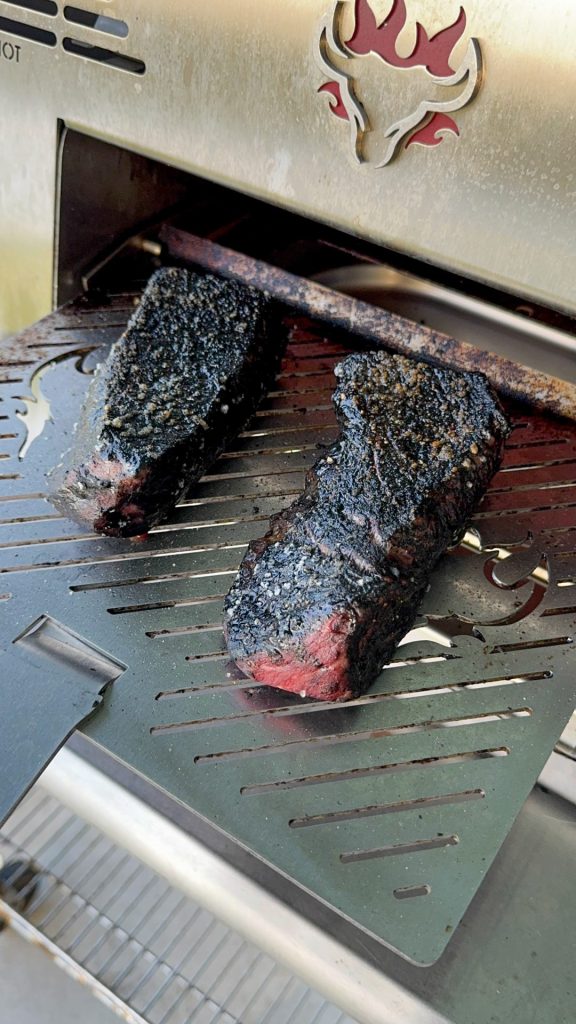
I cooked these American Wagyu Denver Steaks in the Schwank 1500 Degree infrared grill. The steak appears black on the outside because I put a touch of activated charcoal on them for color contrast when I sliced them.
How to Make this Ume Ggyu Dare Dipping Sauce (Japanese Beef Sauce)
In a bowl, combine the soy sauce, mirin, sake and rice vinegar. Then, place in a pot and let boil for 2 minutes. Let the mixture cool and then put in the refrigerator for at least 8 hours to let the flavors meld before using. This is a great marinade for beef that can also be combined with other ingredients to make a dipping sauce for beef. Combine one cup of this marinade with one tbsp ume paste to make this Ume Gyu Dare Dipping sauce.
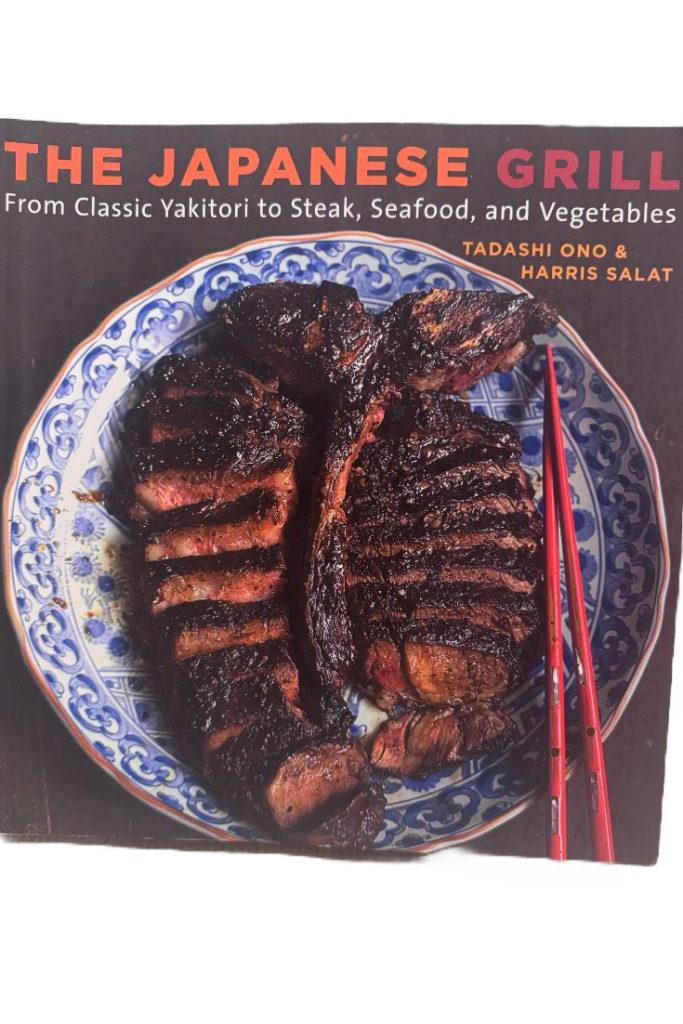
The Japanese Grill Cookbook by Tadashi Ono is a gamechanger for anyone who loves to grill.
Denver or Zabuton Steak Substitutions
While Denver or Zabuton steak is the ideal cut for this recipe due to its tenderness and rich flavor, here are a few suitable substitutes if you can't find it:
- New York Strip Steak: A classic choice that offers a good balance of tenderness and flavor. It's a versatile cut that can handle various cooking methods.
- Ribeye Steak: A rich and flavorful option with ample marbling. It's a great choice for those who prefer a more robust steak.
- Filet Mignon: A tender and lean cut, perfect for those who prefer a delicate flavor. However, it may be more expensive than the other options.
Other Variations
Dipping Sauce: While the Ume Gyu Dare sauce is a fantastic choice, you can experiment with other dipping sauces to complement the steak. Here are a few ideas:
- Classic Chimichurri: A vibrant and herbaceous sauce that pairs well with grilled meats.
- Cowboy Butter: A rich and flavorful sauce that adds a buttery richness to the steak.
- Blue Cheese Butter: If you love blue cheese, this blue cheese basil butter will be your new bestie for steaks.
FAQ: Denver Steak
What is Denver Steak?
- A relatively new, premium cut of beef.
- Known for its tenderness and rich flavor.
- Often compared to a cross between a ribeye and a New York strip.
- Named “Zabuton” after the Japanese word for “cushion,” referring to its shape.
Where Can I Find Denver or Zabuton Steak?
- Not widely available in grocery stores.
- Look for it at specialty butcher shops or order it online from premium meat suppliers.
How to Cook Denver Steak
- Best Cooking Methods: Grilling or pan-searing.
- Target Temperature: Medium-rare (130°F) for optimal tenderness and flavor.
- Resting Period: Allow the steak to rest for 10 minutes after cooking to redistribute juices.
- Dipping Sauce: The recipe includes a Japanese-inspired Ume Gyu Dare sauce, but you can also use classic chimichurri, garlic-herb butter, or soy-ginger sauce.
Can I Substitute Other Cuts of Beef?
Yes, you can use:
- New York Strip Steak
- Ribeye Steak
- Filet Mignon (more expensive)
Tips for Cooking the Perfect Denver Steak
- Room Temperature: Let the steak sit at room temperature for 30 minutes before cooking.
- Seasoning: Generously season with salt and pepper.
- High Heat: Cook over high heat to achieve a good sear.
- Internal Temperature: Use a meat thermometer to monitor the internal temperature.
Resting Period: Allow the steak to rest for 10 minutes before slicing.
Now, let's get to the recipe shall we? If you love this recipe don't forget to leave a review and comment below! Thanks for checking out my site! ~ Robyn
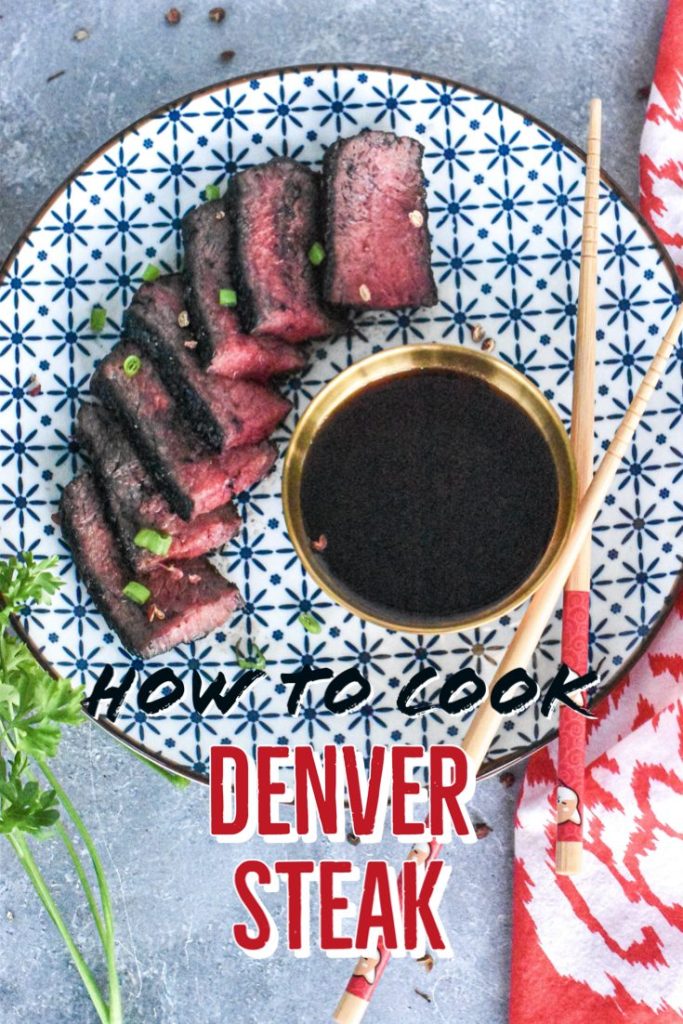

What is a Denver Steak? Why Zabuton Is The Best Beef Cut You’ve Never Heard Of
Ingredients
- 2 Snake River Farms American Wagyu Denver Steaks Snake River Farms labels this as Zabuton
- 1- 2 tbsp kosher sea salt
- 1 tbsp fresh ground black pepper
- 1 cup Gyu Dare Dipping Sauce and Marinade ingredients below
- 1 tbsp Ume Paste - aka "Umeboshi Paste" "Pickled Ume Plum Puree" - this is the one I use that I use found on Amazon
Ume Gyu Dare Dipping Sauce Ingredients
Recipe from Japanese Grill Cookbook
- ¾ cup soy sauce you can swap with Coconut Aminos if you are soy and or gluten free
- ½ cup sake
- ½ cup mirin
- ¼ cup rice vinegar
- *Note all marinade ingredients can be found at most grocery stores except the Ume Paste- this will need to be ordered online, as will the Denver steaks which are not common to find in most grocery stores).
Instructions
- How to Make Ume Gyu Dare Dipping Sauce (optional but so good!)
- Combine Ingredients: In a bowl, combine soy sauce, mirin, sake, and rice vinegar.
- Boil: Transfer the mixture to a pot and bring to a boil.
- Cool and Chill: Let the mixture cool completely, then refrigerate for at least 8 hours to allow the flavors to meld.
- Create Dipping Sauce: Combine 1 cup of the chilled marinade with 1 tablespoon of ume paste.
Prep the Steak:
- Let the steak sit at room temperature for 30 minutes.
- Drizzle with olive oil.
- Generously season with salt and pepper.
Cooking Methods:
- Cast Iron Skillet: Follow your preferred method for cooking steak in a cast-iron skillet.
Grill:
- Preheat grill to 500 degrees (direct heat).
- Grill each side for 2 minutes, or until desired sear marks appear.
- Remove from grill when the internal temperature reaches 130 degrees (medium-rare).
- Let the steak rest for 10 minutes before slicing.
Serving:
- Slice the rested steak into 1/8-inch pieces.
- Serve with Ume Gyu Dare Sauce for dipping.
Notes

